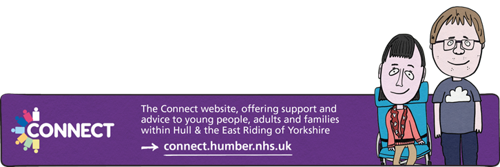Children's Learning Disability Team
The Hull & East Riding Children’s Learning Disability Team is a specialist team of Learning Disability nurses with input from Clinical Psychology, Creative Therapy and Psychiatry.
The team aims to provide:
- specialist assessment, intervention and advice on an individual basis
- support for children with a learning disability to help them to reach their full potential in relation to social, physical and psychological health needs
- advice and consultation to children, families, carers and other professionals involved
- training for staff, carers and families in specific topics
- participation in planning and developing of new services for children with a learning disability
- promotion of collaborative working between health professionals and other agencies, including voluntary organisations
Find out more about the Children's Learning Disability Team on connect.humber.nhs.uk.
Supporting the health and wellbeing of children, young people, adults with learning disabilities, and their families across Hull and the East Riding of Yorkshire, Connect includes detailed, accessible information on all of the Trust’s services for children and for adults with learning disabilities.










